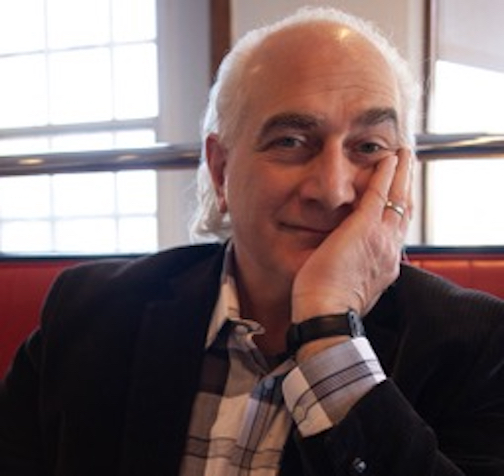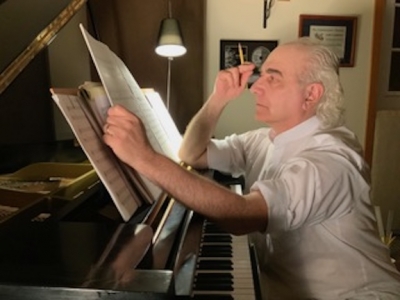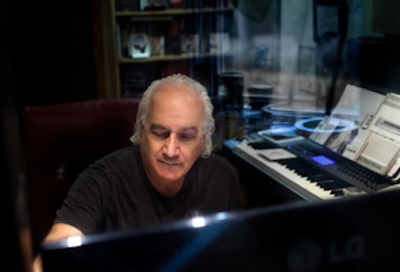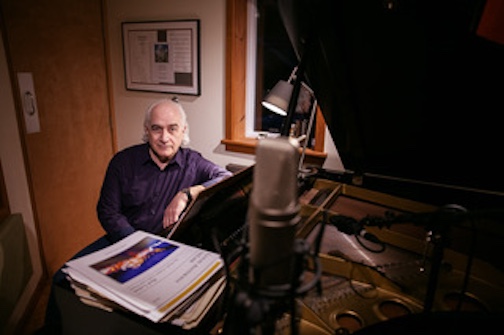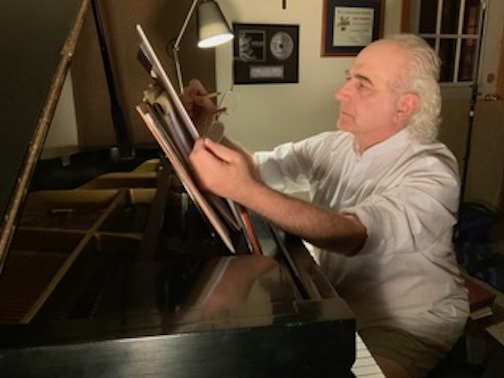Louis Anthony deLise has a wonderful new album titled
Iridescence, which will be released on August 16, 2024. It's been 4 1/2 years since we did an
interview [link], so it was definitely time to do any update. Louis has been a lifelong musician/composer/performer/side-man/arranger/producer and more, and has been active in a wide range of music genres and styles with a staggering number of different artists. We talked more about his earlier career in
the first interview and focused more on the new album and recent past for this one. Enjoy!
KP: Hey Louis! How are things in New Jersey today?
LAd: Things are great, except it’s pretty hot!
KP: We're getting close to the release date of your new album, Iridescence on August 16th! Tell us a bit about the album.
LAd: Iridescence is my fourth solo album and continues my exploration of solo piano and piano chamber ensemble compositions. This album includes nine songs without words, including one collaborative composition with Nancy Rumbel. I’ve invited several other music friends along for the creative ride. In addition to Nancy playing oboe and English horn, I recorded with cellist Vivian Barton Dozor (who is the Assistant Principal with the Opera Philadelphia Orchestra), flutist John McMurtery (from the Las Vegas Philharmonic) and new age artist, guitarist Bruce McFarland (who has a solo career and records with the Celtic World Orchestra).
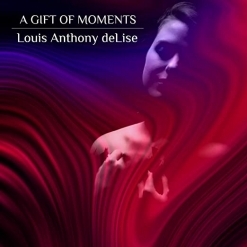
Click on album covers to
go to Kathy's reviews.
KP: As you mentioned, this is your fourth album under your own name, but you have worked on so many others in a variety of musical capacities. Do you have any idea of how many albums you have had a hand (or two!) in?
LAd: Nope! I truly don’t. (Your question caused me to take a look at All Music and Discogs. The lists are incomplete and also include records I forgot about or compilations that I didn’t know about!) And if one adds in the music I’ve written and recorded for broadcasting — it’s hundreds of individual titles and hundreds of separate recording sessions. It’s a lot!
KP: No doubt! Nancy Rumbel (of Tingstad and Rumbel) is one of the guest artists on the album and she has played on some of your other albums, too. How long have you known Nancy and how did you meet her?
LAd: Nancy and I met at a Grammy organization behind-the-scenes meeting; I think that was in about 2017. We hit it off personally and then really connected musically.
KP: Have you played on any of her albums?
LAd: Not yet.
KP: The Iridescence album actually started with a piece you wrote as a birthday gift for Nancy. Tell us about that.
LAd: Nancy had mentioned to me that she was approaching a milestone birthday. For a few years now, I have been composing small pieces as birthday gifts for very good friends. I thought that for Nancy I’d compose and record a backing track and invite her to create a melody over top. I did and she did — and the results became “Iridescence,” the composition. That eventually instigated the full album.
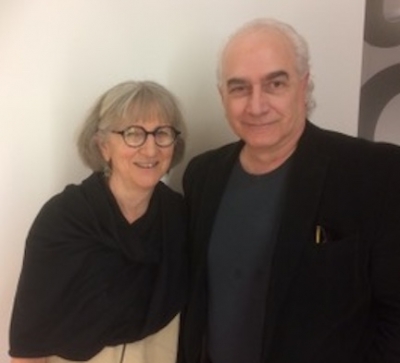
Louis with Nancy Rumbel
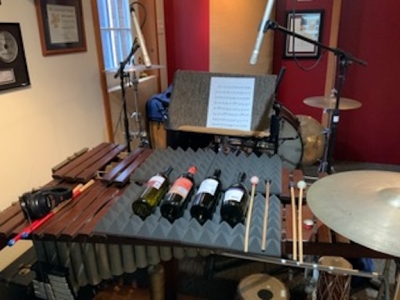
The wine bottle xylophone.
KP: One of the instruments you play on the album is a "wine bottle xylophone." How did you craft it and how did you tune it so beautifully?
LAd: As a concert percussionist, I have been exposed to many compositions that make use of so-called “found percussion.” During the pandemic lockdown, my wife, Theresa, and I decided to save bottles—you’re going to ask why and I’m not going to have a very good answer, except that it was a very weird time and, well, doing weird stuff seemed to be OK! I’ve always liked to use “found” items as percussion instruments. I sorted through dozens of empty wine bottles and found an octave or so that produced a nice, clear pitch when struck with a xylophone mallet. I decided I’d make use of them in a few pieces. They’re not featured but help create part of the supporting fabric for the lead lines.
KP: So you didn't actually tune them? I assumed that maybe you added water or something to change the pitches.
LAd: I did not tune the bottles. I sorted, tested and used those that sounded solid pitches.
KP: You also used a scrap metal bushing as a bell. Do you often repurpose odds and ends into musical instruments?
LAd: Yes. This has been a career-long preoccupation of mine. I guess in some ways, I’m still that nine-year old drumming on the kitchen pots — and everything else! A few years ago, I produced an album for an Americana artist where I used a heavy chain that I dropped on a resonant wooden floor. It was a great sound and worked very well on the record!
KP: In my review of the album, I said: "Warm, reflective and often very soothing, Dr. deLise's new work is the perfect antidote for the chaos the world is currently experiencing and offers hope, comfort and room to breathe. Thank you!" Was that your intention with the album or was it how it naturally evolved?
LAd: I am always making compositions that reflect my then-current feelings or that help me to reach a mood I hope for—really, to help me feel better. I honestly didn’t realize I was doing what you very kindly suggest I did! I was just playing what I felt at the time or was hoping to feel. My wish, always, is that these notes I put together help other folks to feel better, too.
KP: One of the most moving pieces on the album is "The Loves We Lost." Tell us about that one.
LAd: One overcast day in March, I sat at my grand and began to play some minor chords. I have noticed that there are many piano tunes that employ a descending bass line so I thought I’d be a contrarian and start with an ascending line. Of course, the very common progression of C to B-natural to B-flat, and so on, turned around on itself becomes C to D-natural to E-flat, etc … I used that ascending bass line and harmonized it with essentially the same chords as are often used in the descending cliché. Wait … too much? See! This is what happens when you ask a music theory geek about his composing! Sorry.
KP: [Lol!]I also really like "Some Kinda Lullaby." How did you decide on the title?
LAd: Well, as often happens at the end of a workday, Theresa brought me a glass of red—yes, I’m very spoiled! I played for her what I had been working on—she said something like, “That sounds like some kinda lullaby …” and there you have it!
KP: It could be a really dreamy slow dance as well as a lullaby - very warm and cuddly!
LAd: Yes. I know you’re right and what is that “really dreamy slow dance” of our imagining, but a warm cuddle with someone special?
KP: Yep! "Dusk" has a very magical and mystical feeling about it and features your wine bottle xylophone as well as strings, piano, keyboards and light percussion. How would you describe this piece and the inspiration for it?
LAd: Well, again with this piece I wanted to buck the now-standard, cliché really, accompaniment that we hear so often in contemporary instrumental piano writing—the left-hand accompaniment that goes root-then up the fifth - then up to the tenth, and so on. I determined I’d create an accompaniment that mostly did the same thing, but backwards. I started with the root, then went down to the fifth. The left hand follows a do-re-mi pattern, but always goes back to the fifth—creating a dominant pedal that anchors the piece. The melody came to me as I played the accompaniment. I love the minor-ninth chord sound, so beginning the piece with the ninth in the melody was a natural. Later, when I was orchestrating the piece, I decided that I’d try to create a “film noir” sense—keeping with part of the album’s theme of describing different kinds of light in music.
KP: Interesting! I said in my review of "That First Morning" that it "is like a peaceful sunrise set to music - gently hushed yet full of optimism and promise. Piano, percussion, and light choral voices soothe and uplift." You mentioned to me that it could be about that first morning after a breakup. Is that what you had in mind when you composed the piece? It feels so relaxed and contented to me.
LAd: Kathy, you ask the right questions to make one think! Maybe it’s also optimism and promise one feels deep inside the pain of an ending. (I do tend to be a cock-eyed optimist, so I’m going to go with your positive interpretation of my music!)
KP: Do you plan to perform this music in concert?
LAd: Nope! Probably not. I don’t have a concert presence and I am very, very content composing and recording at my home studio—putting out recordings and producing sheet music for my publisher. I spent more than thirty years performing in-concert. I am happy not to do the live-and-in-person thing. Will I make video recordings of my playing? Sure. I think that’s a possibility and a good “proof of life” thing to do! Could a great music buddy convince me to play an interesting concert gig — yep. Probably!
KP: Will there be sheet music for Iridescence?
KP: You recently helped Robin Spielberg achieve her dream of having her music orchestrated for her By Way of the Wind album. How did that project come into being?
LAd: I met Robin a few years ago, also through a Grammy organization function (I was on the Board of Governors with her in Philadelphia). Theresa and I attended one of Robin’s shows and afterwards I glibly said something like, “Hey, you really ought to have me arrange some of your stuff!” Then in 2022, Robin and her husband, Larry, approached me about helping them create the orchestral versions of some of her music.
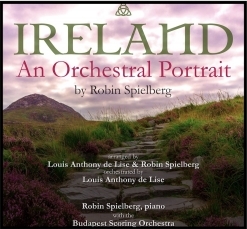
Click on album covers to go to Kathy's reviews.
KP: Are you going to orchestrate more of Robin's music?
LAd: Gosh, I hope so! Robin is wonderful to work with. She really gets it! She is not selfish or territorial. She is also a knowledgeable musician who understands the production process. I am hopeful her album, By Way of the Wind is fantastically successful and provides a reason for a follow-up.
KP: I've known Robin for more years than I care to admit and we're great friends! She is a gem!
Other than Robin and Nancy Rumbel, have you worked with other new age/contemporary classical/ambient artists?
LAd: I have had the privilege of recording with Jeff Oster and writing and recording with both Dyan Garris and Ed Bazel. I’ve also recorded extensively over the years with guitarist, Bruce McFarland, who has a solo career and records with the Celtic World Orchestra.
KP: Since it's been 4 1/2 years since our last interview, I'll ask again: If you could have any three wishes, what would they be?
LAd: (1.) I wish that Donald J. Trump and his acolytes are kept away from the levers of power in our government. (2.) I wish for equal opportunity, treatment and respect for all Americans of all races, beliefs, origins, genders and orientations. (3.) I wish for peace, respect, and civility in the world and in all aspects of our living.
KP: Amen!
Many thanks to Louis Anthony deLise for taking the time to do this interview! For more information about Louis and his music, be sure to visit
his website and his
Artist Page here on MainlyPiano.com.
Kathy Parsons
July 2024

